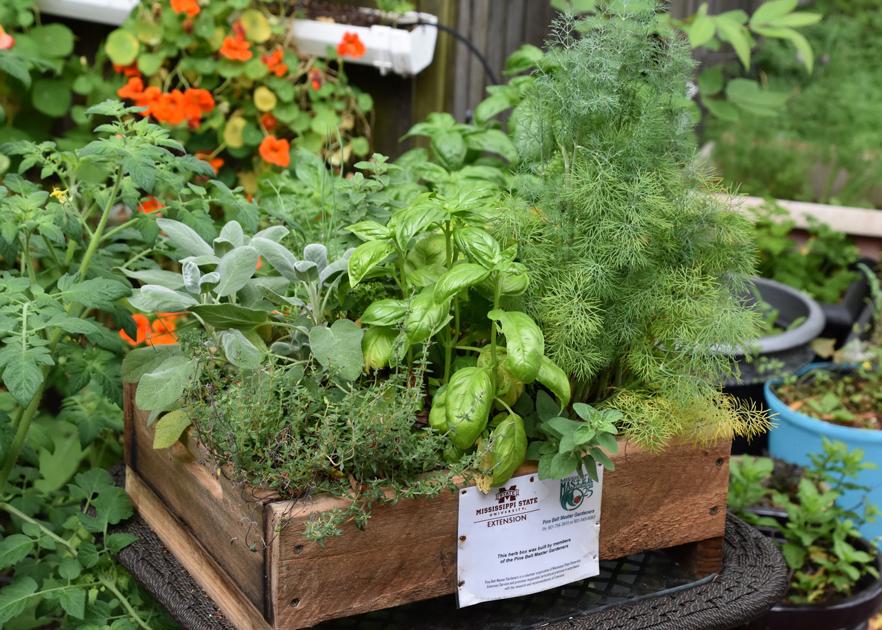
Question: I have been cooking at home so much more this past year and have been experimenting with recipes that call for fresh herbs. They are expensive to purchase in the grocery store, and I like the idea of picking my herbs fresh on an “as needed” basis. So, I would like to plant a culinary herb garden. What gardening advice can you give?
Answer: Growing your own culinary herb garden is an inexpensive alternative to purchasing fresh herbs at the grocery store, plus, it is exciting to just step outside and snip whatever herb you need for that night’s dinner. Growing your own herbs will add a fresh flavor to your recipes, and they are relatively easy to grow.
Most home gardeners do not grow large quantities of any one herb. Generally, you only need a small amount to add to your recipes. Herbs can be grown as part of your vegetable garden, in a garden devoted to herbs, in containers and even indoors.
Herbs can be classified as annuals, biennials and perennials.
Annuals grow and bloom one season and then die. Examples are anise, basil, chervil, cilantro, coriander, dill and summer savory.
Biennials live for two seasons, blooming the second season only. Examples are caraway and parsley.
Perennials overwinter and bloom each season once they become established. Examples are chives, marjoram, mint, rosemary, tarragon and thyme.
All herbs have similar growing requirements. They prefer at least six hours of full sun in well-drained soil. Some herbs will tolerate light shade, but herbs will not tolerate wet soil. Herbs do not need to be fertilized as often as other plants in the garden. Liquid fertilizers should be applied once every two to six weeks for herbs growing in the ground. Granules only need to be applied once or twice during the growing season.
Regardless of what type of fertilizer you buy, read the directions carefully before adding anything to the soil. If you over-fertilize, the plant will produce lots of foliage and will result in herbs with poor flavor. Also, over-fertilizing can encourage root and stem rot diseases. The exceptions to that are chervil, fennel and summer savory, all of which require moderate amounts of fertilizer.
Once herbs are established, they can tolerate dry conditions, but supplemental water is recommended during periods of drought. Mulch can be used to conserve soil moisture, but keep it away from the base of the plants.
The majority of culinary herbs can be sown from seed. Before sowing seed, work the soil surface to a fine texture and wet it slightly. Make a shallow trench, plant the seeds and firm the soil over them. Generally the finer the seed the shallower it is planted but follow packet directions. After planting, water with a fine mist of water.
Many herbs can be started indoors and planted outside after the danger of frost has passed.
Many gardeners prefer to grow herbs indoors. Basil, chives, mint, oregano, parsley and thyme tend to thrive when grown indoors. The pots used need to have adequate drainage because if the bottom of the pot sits in water, the roots of your herbs will die. A good rule of thumb is to water thoroughly only when soil surface is dry to the touch.
Indoor herbs require weekly applications of liquid fertilizer or fish emulsion whenever the plants are actively growing. Herbs require lots of sunlight, so you will either need to provide supplemental lighting or you will need to place plants as close as possible to your brightest window on a south-facing side.
Harvesting herbs is very satisfying. When clipping what you need, just be careful and don’t clip more than a third of the herb at a time. Try to harvest early in the day after plants dry off and before it gets hot.
Herbs are best harvested before they start to flower, otherwise leaf production declines. Deadheading or removal of flowers as they appear will result in the continued production of new leaves suitable for harvest.
Herbs provide beneficial flowers for bees. Also, the smell of mint, basil and rosemary will deter mosquitoes from your garden. Aphids and certain types of flies and beetles will avoid areas with the fragrance of chives. So, in addition to growing fresh herbs for your dinner plate, they will serve a dual purpose when it comes to attracting or repelling insects.
May 08, 2021 at 12:17AM
https://ift.tt/3eqM0g3
Ask a Master Gardener: Planting a culinary herb garden - NRToday.com
https://ift.tt/3eCf9lu
Herb
No comments:
Post a Comment